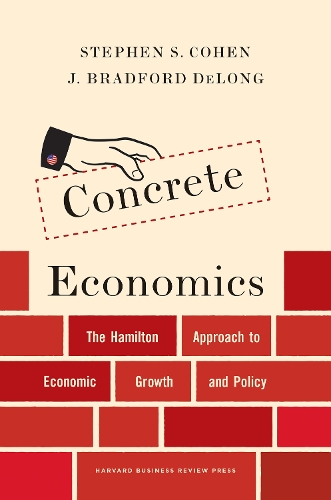
Concrete Economics: The Hamilton Approach to Economic Growth and Policy
(Hardback)
Publishing Details
Concrete Economics: The Hamilton Approach to Economic Growth and Policy
By (Author) Stephen S. Cohen
By (author) J. Bradford DeLong
Harvard Business Review Press
Harvard Business Review Press
1st March 2016
United States
Classifications
General
Non Fiction
330.9
Physical Properties
Hardback
240
Width 139mm, Height 209mm
354g
Description
Brilliantly written and argued,Concrete Economicsshows exactly how the US government has shaped and directed the economy since the very inception of the country.
Cohen and DeLong focus on the forgotten role played by the US government in initiating and enabling a redesign of the US economy. The government not only sets the ground rules for entrepreneurial activity but directs the surges of energy that mark a vibrant economy. It is as true for present-day Silicon Valley as it was for New England manufacturing at the dawn of the nineteenth century.
This is not an argument based on abstract truths, complex correlations, or arcane discoveries, but rather on the facts of how the US economy succeeded so brilliantly. And that provides a blueprint for how the government, established companies, and new ventures can partner to yet again successfully reshape the economy.
Reviews
"... high on readability... a lyrical manifesto." -- Financial Times "Concrete economics reflects the pragmatic policies responsible for American economic development from independence through the 1960's It is the embodiment of Alexander Hamilton's very visible hand expanding the economic space necessary for markets to flourish. Highly recommended. -- CHOICE, the publication of the American Library Association "...a powerful little book with important messages to be debated." -- Marx and Philosophy Review of Books "...easy to read, and extremely informative... a worthy look at the history of the U.S. economy, and how and why it has grown as it has." -- Manhattan Book Review "a valuable lesson to people who run organizations of any type: public, private, for-profit, and nonprofit." -- strategy+business magazine ADVANCE PRAISE for Concrete Economics: Lawrence H. Summers, Charles W. Eliot University Professor, Harvard University-- "Cohen and DeLong's polemical style adds a distinctive voice to economic policy debates. This book may enlighten and infuriate. It is a bold effort by bold thinkers." Michael Lind, author, Land of Promise: An Economic History of the United States-- "In a dynamic economy, private enterprise and public leadership are partners, not adversaries. That is the lesson of the past for the future, drawn by two of the finest economic thinkers of the present in this timely and important book."
Author Bio
Stephen S. Cohen is Professor Emeritus of City and Regional Planning at the University of California at Berkeley, where he is also codirector, and cofounder of the Berkeley Roundtable on the International Economy (BRIE). He has written and edited several books, most recently The End of Influence with J. Bradford DeLong, and his articles have appeared in such publications as Science, Foreign Affairs, Harvard Business Review, and the Wall Street Journal. J. Bradford DeLong is a professor of economics at the University of California at Berkeley. He served as Deputy Assistant Secretary of the US Department of the Treasury in the Clinton administration. He is also a research associate of the National Bureau of Economic Research. He writes a monthly syndicated op-ed column for Project Syndicate. DeLong is also a prolific blogger and commentator on national and international affairs.
